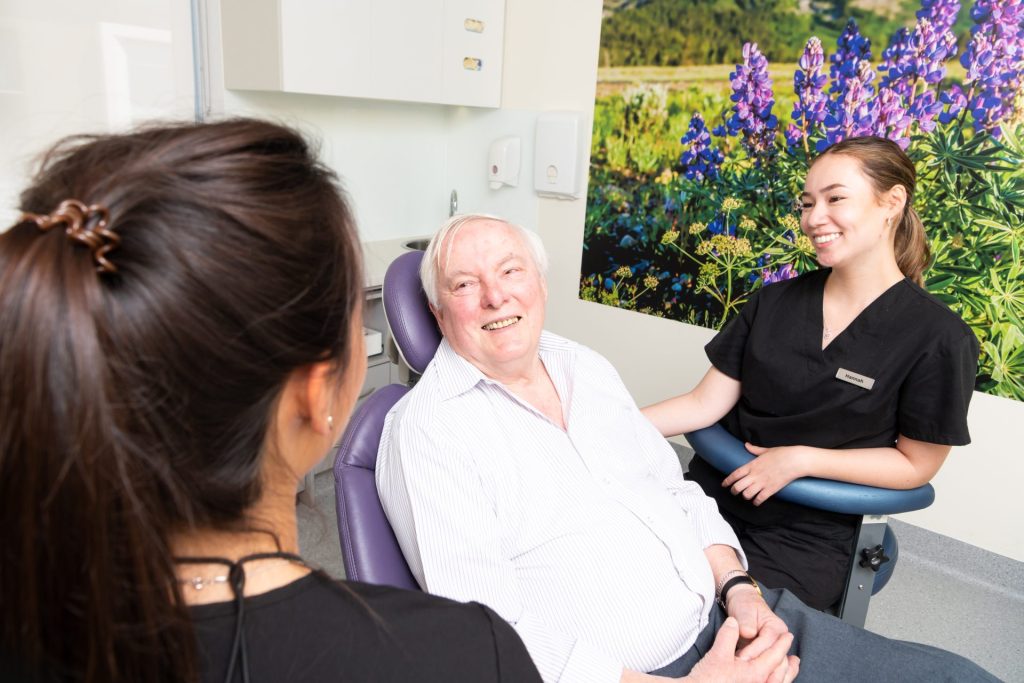
Tackle receding gums for better oral health and a smile you love
Receding gums refers to when your gums start to detach from the surface of your teeth, exposing the roots of your teeth and also altering the look of your smile. There can be several reasons why your gums may recede, though most commonly they include less-than-optimal dental hygiene. It’s important not to ignore receding gums. Not only can receding gums change the appearance of your smile and sometimes bring about tooth sensitivity, but this condition can also lead to tooth loss. Early diagnosis is best, so keeping up with bi-annual dental check-ups is key.
Whether it’s your dental health, self-confidence or both that are affected by your receding gums, our experienced dentists are here to help with gum grafting in Castle Hill. While it may sound a little scary, a gum graft is a simple routine surgical treatment that, when performed by experienced and specially trained dentists, can deliver exceptional outcomes. There’s no need to let gum recession stop you from smiling or enjoying the excellent oral health you deserve. The team at our Castle Hill dental clinic is here to help you.
Why are my gums receding?
There can be many reasons your gums may recede. A consultation with one of our Castle Hill dentists can help you determine the cause and an appropriate solution. Here are some of the common causes of gum recession:
- gum disease
- being too rough when brushing your teeth
- built-up tartar
- smoking or otherwise using tobacco products
- experiencing changes in hormones
- a frequently dry mouth
- your genetics
- grinding your teeth or clenching your jaw
- various illnesses and diseases (such as diabetes and HIV)
What to expect when having a gum graft
Gum grafting is an oral surgery during which your dentist replaces gum tissue in areas where your gums have receded. At our Castle Hill dentist rooms, we use the latest in dental technology and techniques to provide comfortable, safe and effective gum grafts.
Before your dentist begins any part of the gum grafting process, they’ll use a local anaesthetic to numb the area. Once the area is numbed, you shouldn’t feel much, if anything at all.
When performing a gum graft, your dentist uses gum from a range of places in your mouth, animal-derived products that come from a box or a combination of both, as the replacement tissue. Once in place, they’ll then use a super fine material to suture it in place. Your body has a natural healing process which then takes care of the rest by developing new blood vessels that promote the integration of the newly placed gum tissue with the surrounding tissue.
Post-surgery care
After any oral surgery, following your dentist’s aftercare instructions is important for a successful recovery. After your gum graft, our caring dental team will ensure you have all the information you need for optimal recovery. Below, you can find some general post-surgery advice so you can know what to expect:
- Bite down on the gauze placed by your dentist post-surgery for at least 30 minutes.
- If you were sedated or medicated for your procedure, ensure someone drives you home and takes care of you until the effects have worn off.
- Be mindful of not biting your lips, tongue or cheeks as they’ll be numb for a few hours post-surgery.
- Avoid rinsing your mouth, drinking with a straw or spitting for at least 12 hours after your gum graft.
- To reduce inflammation, you can place an ice pack on the outside of your cheek close to the area for half an hour every couple of hours for the first 24 hours.
- Avoid brushing directly over the surgery area for around a month.
- Consider sleeping with your head elevated on two pillows on the first night after your gum graft.
- After 12 hours, you can use warm salty water or Savacol to gently swish around your mouth every 4 hours to aid disinfection.
- It’s important you avoid drinking alcohol, using tobacco products and engaging in vigorous exercise for at least the first two days post-surgery, as each of these elements can hinder the healing process.
- Consuming soft foods for the first week after your gum graft is a good idea to avoid disrupting the surgery sites.
- If you wear dentures, your dentist will let you know when to resume wearing them.
- You may experience some slight discomfort after your treatment, which is perfectly normal. If you experience severe pain, severe swelling, persistent bleeding or a high temperature, it’s important you contact our Castle Hill dental surgery and let us know so we can assist.
- After about a week, you’ll have your follow-up appointment with your dentist who will remove your stitches and assess your healing.
